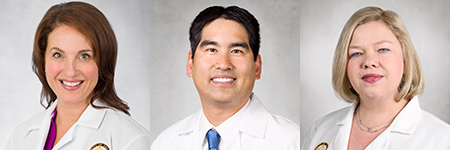|
Problems viewing this email? Click here
|
Dennis Lyon was told his skin cancer had spread and he had just one year to live. Then he came to Moores Cancer Center, where experts analyzed his tumor genome and recommended an immunotherapy not typically used to treat his cancer type. It worked. Today, Lyon's tumors have shrunk by 90 percent. We want to deliver this type of personalized treatment approach to more patients—with every disease. But to do that, we need more genetic and health information from more people to make the right connections. That's the goal of the All of Us Research Program, which officially opened for public enrollment this month. Will you join us in advancing precision medicine? Here's how you can participate.
|
|
|
Clinical trials are how doctors and scientists find new ways to prevent, detect or treat disease. They test novel drugs and medical devices or innovative ways to use existing treatments. UC San Diego Health conducts hundreds of trials each year and has just debuted a new website that makes it easier to find the right trial for you or a loved one.
|
|
Housed in the new Koman Family Outpatient Pavilion, the Comprehensive Breast Health Center is a state-of-the-art space that brings together every aspect of breast cancer care, from diagnosis through the latest, diverse treatments (including access to leading clinical trials) and support during and after recovery by a highly trained team.
|
|
|
There is no really genteel way to discuss the topic, but the bottom line is that fecal matters. What comes out is a clue to what goes on (inside), and knowledge is a terrible thing to waste. Consider this your school on stool.
|
|
More than 3 million Americans suffer from depression, but what is it exactly? What are the differences between the blues, persistent melancholy and complicated grief? Sidney Zisook, MD, professor of psychiatry at UC San Diego School of Medicine, explains.
|
|
It's a journey of inches, but the passage of a kidney stone can seem painfully long. The cause is easy to see: Composed of sharply edged, crystallized minerals and salts, kidney stones are aggregates of agony.
|
|
May is National Physical Fitness and Sports month. If that doesn't have you jumping up from the couch, maybe it should. Regular physical activity extends life, as much as 4.5 years compared to more sedentary persons. Are you doing the minimum? For substantial health benefits, the CDC recommends at least 150 minutes per week of moderate-intensity aerobic activity (or 75 minutes of vigorous intensity). It's best spread over the week, preferably in episodes of at least 10 minutes. Children and adolescents should get at least 1 hour or more of physical activity daily.
|
|
|
When Melissa De La O was diagnosed with an acoustic neuroma, a rare, non-cancerous brain tumor that often times leaves patients with hearing loss, she knew what she was up against. Thirty years earlier, the same type of tumor rendered her father partially deaf.
|
|
Certified athletic trainers in our Sports Medicine program can work with you to help prevent and recover from injuries and surgery. In the first of four videos, they walk us through four knee exercises you can do at home. To make an appointment, visit health.ucsd.edu/SportsMed.
|
|
|
Over-the-counter medications are designed to be broadly safe and healthful, but persons undergoing chemotherapy should take special care and note: Some OTC drugs and herbal supplements can interfere with cancer treatment, such as masking symptoms, affecting dosages or even increasing a drug's toxicity.
|
|
In a recent clinical trial, some patients with type 2 diabetes showed a clinically significant reduction in blood glucose after taking an anti-asthma drug for 12 weeks. We talk to Alan Saltiel, PhD, who led the study, about what this drug is, why it seems to help some diabetics but not others, and how his team is working to personalize diabetes treatments.
|
|

L-R: Amanda Gosman, MD; Daniel Chao, MD, PhD; Marianna Alperin, MD
|
- How do facial bones change as you age?
- What are eye floaters and how do I get rid of them?
- Can childbirth cause pelvic floor disorders?
|
|
Gloria Leichter-Wilder, RD, nutrition specialist at UC San Diego Health, dishes up best practices on building a healthy, filling salad, including which lettuce to choose, which toppings to load up on, which to avoid and how not to ruin your healthy salad with the calorie bomb disguised as dressing.
|
|
|
You are receiving this email because you subscribed to our newsletter or you attended a UC San Diego Health event.
You may unsubscribe by using the links below.
|